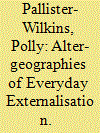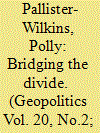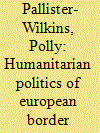| Srl | Item |
| 1 |
ID:
188534


|
|
|
|
|
| Summary/Abstract |
In reflecting on the contributions to this Special Issue, I am struck by the rich breadth of empirical research on borderwork that is undertaken by a plethora of actors across numerous African sites and spaces. When asking a deceptively simple question – how is everyday borderwork experienced in (externalised) African spaces? – this Special Issue shows borders’ kaleidoscopic variation and the contentious politics of borderwork as is. This kaleidoscopic variation and contentious politics speak to earlier work in political geography and critical border studies around borderscapes, where borders, as the products of work, are considered not only multiple in terms of location and scale but to also be productive spaces and importantly sites of struggle (Brambilla Citation2015; Brambilla and Jones Citation2020).
|
|
|
|
|
|
|
|
|
|
|
|
|
|
|
|
| 2 |
ID:
138984


|
|
|
|
|
| Summary/Abstract |
Building on a long history of spatial control through walling in the region, walls and fences have been built in the Middle East in recent years to undertake a range of practices. Gated communities, residential and security compounds, anti-migrant walls, separation barriers and counter-insurgency fences can all be found in the Middle East. These walls address and govern problems that take the population as their subject. These walls all share a common frame of viewing the populations they work to govern as ‘problematic’ in multiple ways. This paper explores how walls have been and continue to be used in governing populations through mobility and incorporating a combination of disciplinary and biopolitical techniques through a range of spatial and territorial repertoires. As such it works to bridge the divide in border studies and critical security studies between geopolitical/topographical and biopolitical/topological approaches to borders and governance.
|
|
|
|
|
|
|
|
|
|
|
|
|
|
|
|
| 3 |
ID:
144783


|
|
|
|
|
| Summary/Abstract |
What do security barriers do beyond blockading or demarcating territory? This article argues for an understanding of security barriers as sociotechnical devices. It argues for a rearticulation of security barriers as more than territorial technologies or the products and producers of sovereign power. It advances the discussion of security barriers beyond what can be thought of as a ‘geopolitics of security’, where the referent object is territory, and asks that we also consider how they work with mobility as productive devices to govern people in a variety of ways. The article empirically analyses the fences of Ceuta and Melilla, the barriers of Israel’s occupation of the Palestinians, and the US counterinsurgency fence in Falluja. Building on these illustrative cases, the article argues that security barriers should be understood as products of particular modes of government and producers of particular populations through their ability to perform interruptions and capture data.
|
|
|
|
|
|
|
|
|
|
|
|
|
|
|
|
| 4 |
ID:
137615


|
|
|
|
|
| Summary/Abstract |
This paper explores humanitarianism in the practice of Frontex-assisted Greek border police in Evros and of Frontex at their headquarters in Warsaw. Building on the increase in humanitarian justifications for border policing practices as well as the charges of a lack of humanity, the paper analyzes the relations between humanitarian responses and border policing where humanitarianism is used for framing and giving meaning to institutional and operational practices. In offering an interpretive view of border policing undertaken by people in their working lives across sites and scales, it builds on the critical literature addressing the multifaceted nature of border control in Europe today. At the same time, it speaks to wider debates about the double-sided nature of humanitarian governance concerned with care and control. It argues that while humanitarian motivations have implications for operations in the field and help to frame “good practice” at the policy level, humanitarianism should not be seen as additional or paradoxical to wider border policing operations within forms of governance developed to address the problems of population. Conflict arises in the paradox of protection between the subject of humanitarianism and policing, the population, and the object of border control, the territorially bounded state or regional unit.
|
|
|
|
|
|
|
|
|
|
|
|
|
|
|
|
| 5 |
ID:
144248


|
|
|
|
|
| Summary/Abstract |
This article focuses on the use of Personal Protective Equipment in humanitarianism. It takes the recent Ebola outbreak as a case through which to explore the role of objects in saving individual lives and protecting populations. The argument underlines the importance of PPE in mediating between individual patient care and biosecurity. In addition it questions the preoccupation with technical fixes; challenges dominant perceptions about the subject of humanitarianism being the victims of disaster; traces the production of a particular politics of life; and explores the individualisation of risk and concomitant processes of labour discipline in the everyday lives of humanitarian workers.
|
|
|
|
|
|
|
|
|
|
|
|
|
|
|
|